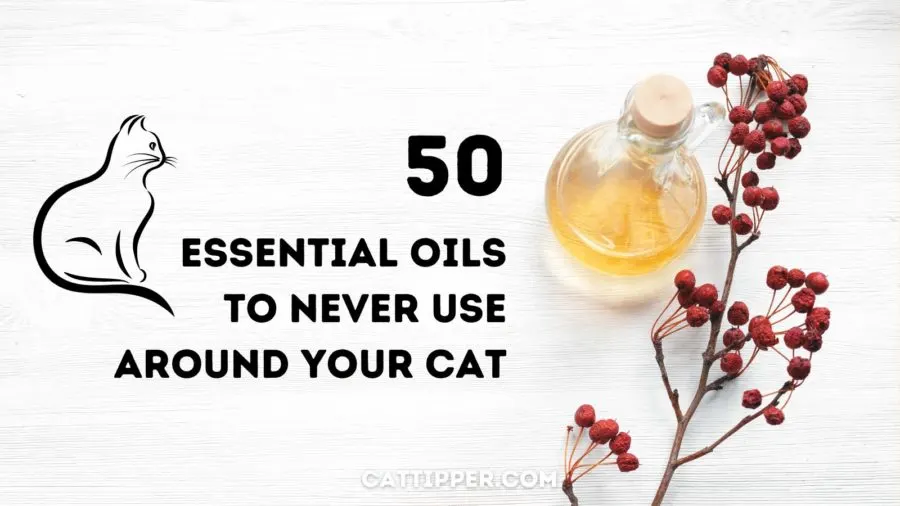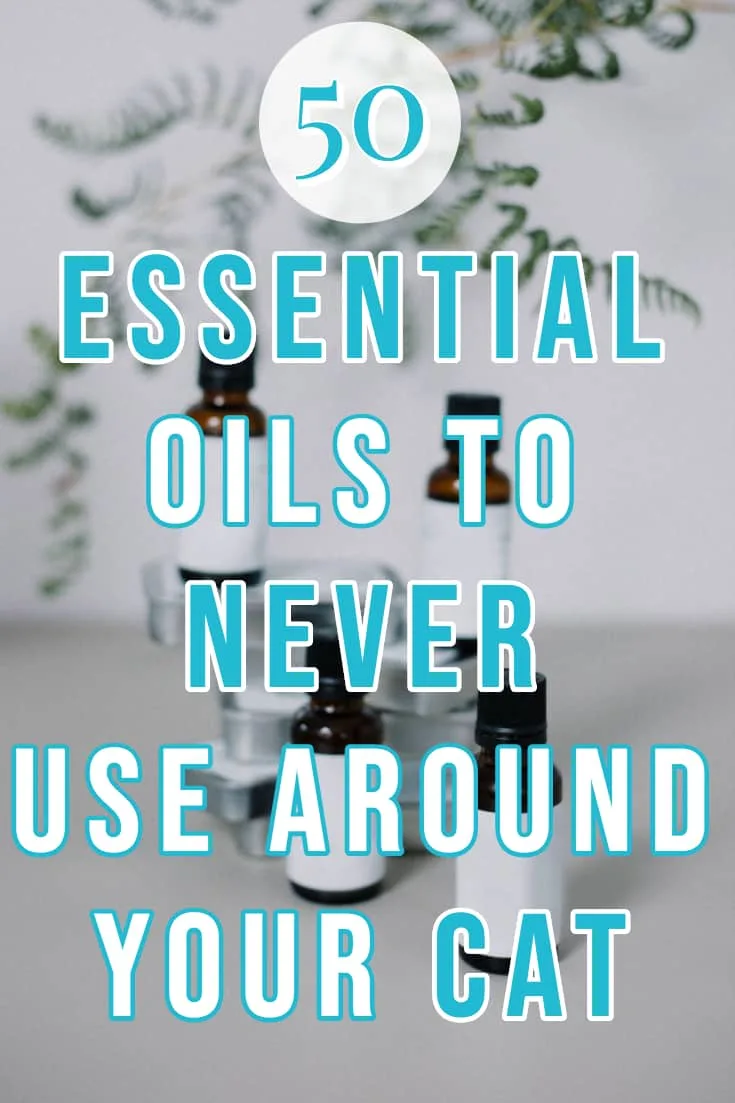Essential oils are a popular way to provide natural fragrance in your house–but they have to be used with caution in cat households. If you are wonder if essential oils are safe for cats, please note that many essential oils can be toxic to cats, even when they’re not being used directly on your cat. We’ve got veterinary advice on use of essential oils in your cat’s home–and 50 essential oils to avoid.
This guest post from the Texas A&M University College of Veterinary Medicine & Biomedical Sciences is important to read if you use essential oils in scenting your house, cleaning your house or for your own health.

Essential oils are often presented as a naturalistic approach to personal care and home fragrance. However, just because these oils are derived from plants doesn’t make them healthy, or even safe, for your cat.
Dr. Murl Bailey, a professor at the Texas A&M College of Veterinary Medicine & Biomedical Sciences (CVM), advises pet owners to use essential oils with caution.
Danger of Diffusers to Cats
When essential oils are used in fragrance diffusers, the oils are widely distributed within a room. Because many of the oils commonly purchased in stores can be toxic to cats, if a cat breathes in a harmful oil, it may cause respiratory irritation.
“Diffused oils are very dangerous, as the oils are inhaled,” Bailey said. “Not only are these oil droplets dangerous themselves, but the inhalation of these oils can cause a foreign body pneumonia in cats.”
Some diffusers, which act by aerosolizing the oil, release micro-droplets into the air that may collect on the fur of a pet cat.
When the cat grooms itself, the oil may be ingested.
Symptoms of Respiratory Irritation in Your Cat
Symptoms of respiratory irritation include a watery nose and eyes, drooling, vomiting, and difficulty breathing.
In cats, difficulty breathing may be mistaken for the animal trying to expel a hairball.
Difficulty breathing can be distinguished by the cat crouching low to the ground with little abdominal movement and no hairball production.
What to Do If You Suspect a Problem
If a cat owner suspects that their pet is in distress, they should move their cat to fresh air immediately.
If the cat does not quickly recover, the owner should seek emergency veterinary care.
For any instances of poisoning, owners can also call the Pet Poison Helpline at 855-764-7661 or the ASPCA Animal Poison Control Center at 888-426-4435.
Danger of Spills
Essential oil diffusers also pose the hazard of tipping over.
If this happens, there is the possibility that a cat might ingest spilled oils, which Bailey warns against.
Ingestion of Essential Oils
“Essential oils should never be given by mouth or in the animal’s food,” Bailey said.
“Oral ingestion can cause vomiting, diarrhea, and central nervous system depression, which can cause symptoms such as decreased heart and breathing rates. Seizures are also possible from large doses.”
Which Common Essential Oils Are Toxic to Pets?
Though cat owners should consult with their veterinarian before introducing new products to their pet’s environment, Bailey provides a list of more common oils that are toxic to pets:
- Basil
- Bergamot
- Bitter almond
- Cinnamon
- Clove Leaf
- Eucalyptus
- Geranium
- Juniper
- Lavender
- Lemon
- Lemongrass
- Lime
- Mint (Including wintergreen, spearmint, and peppermint)
- Myrrh
- Orange
- Pine
- Rose
- Rosemary
- Sandalwood
- Sassafras
- Tarragon
- Tea tree
- Thyme
- Wormwood
- Ylang ylang
Other less common essential oils that are also toxic include:
- Armoise
- Bay leaf (W. Indian)
- Birch (sweet)
- Boldo leaf
- Buchu
- Calamus
- Clary Sage
- Cornmint
- Horseradish
- Japanese Yew
- Hyssop
- Lanyana
- Mustard
- Oregano
- Pennyroyal (N. Am.)
- Pennyroyal (Eur.)
- Sassafras (Brazilian)
- Savin
- Savory (Summer)
- Southernwood
- Spruce
- Tansy
- Thuja
- Tree wormwood
- large wormwood
- Western Red Cedar
- Wormseed
These products offer a natural method of home fragrance, but what works for you may not always be best for your cat. When using essential oils in the home, a cautious approach is best.
As always, pet owners should consult with their veterinarian about any hesitancy they have before using these products to ensure that they are acting in the best interest of their pet.
Pin it to remember 50 Essential Oils Not Safe for Cats

- 🎉 GIVEAWAY: Lord of the Pets Portrait of Your Cat! - November 26, 2024
- Review: Lord of the Pets Cat Portraits! - November 26, 2024
- Cat Adoption: FAQ You Might Have - June 28, 2024
